It is exactly two weeks until Brazilians vote in a presidential run-off that is now set to be tighter than ever, with the latest polls showing the lead of leftist frontrunner Luiz Inacio Lula da Silva cut to just five percentage points.
In its first poll since the first-round vote on 2 October, AtlasIntel on Thursday showed close to 52% of voters would support Mr Lula, compared to almost 47% for the incumbent Jair Bolsonaro.
Not only is the vote tight, but it is also so polarised, that environmentalists and indigenous peoples are framing it as a battle for the future of the Amazon rainforest itself.
Deforestation in the Amazon, widely described as the lungs of the planet, is currently at its highest rate in 15 years, sending climate change towards a tipping point, that could ultimately put the whole planet in danger.
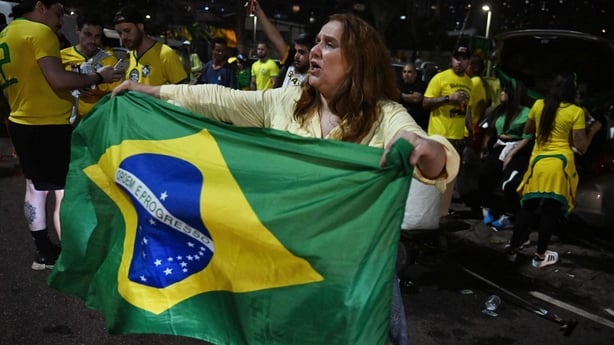
New data, published last week, showed that deforestation in Brazil's Amazon rainforest had affected the largest area for the month of September, since current records began.
"Bolsonaro represents the legalisation of the destruction of the Amazon. Bolsonaro is not only a threat and a tragedy for indigenous peoples and for Brazil. He represents tragedy for the whole world," Sônia Guajajara, an internationally recognised environmental activist warned in an election victory interview with Channel 4 news.
She won a seat in Congress, becoming the first federal Indigenous lawmaker to do so in the state of Sao Paulo, her Socialism and Liberty Party (PSOL), backing a Mr Lula presidency.
Indigenous candidates standing in Bolsonaro backlash
A record 171 indigenous candidates, most of them women and many coming from the Amazon, ran for federal or state office in these elections, their numbers a direct backlash against the policies of Mr Bolsonaro.
When he first took up office, he promised not to allow "one more centimetre" of protected indigenous reserves in Brazil, leaving tribal people in a fight for their very existence.
Sônia Guajajara ran her campaign, carrying a Brazilian flag splashed with red paint to symbolise the spilt blood of her people. She says that now the presidential vote has gone to a runoff, Brazil is precariously balanced between democracy and authoritarianism.
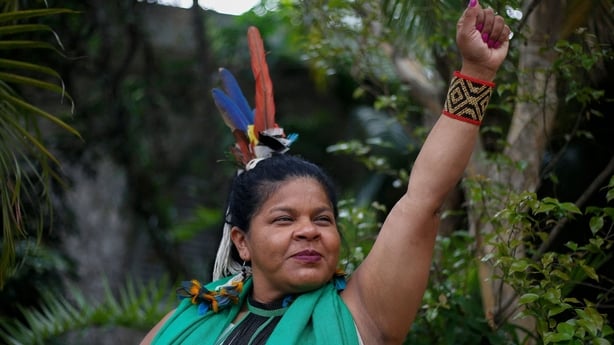
As the leader of the Association of Brazil's Indigenous Peoples (APIB), she says she will demand that Mr Lula, who has promised to create a ministry of Indigenous affairs, resumes protecting native lands if he is elected.
"We want to rebuild all the pro-Indigenous policies the Bolsonaro government dismantled," she said.
She was named on TIME Magazine's list of the world's 100 most influential people this year and says that Mr Bolsonaro's time in office has been nothing short of "institutionalised genocide," including a push to legalise mining on Indigenous reservations, as well as vocal support for wildcat gold miners - a group accused of invading native lands, raping and killing inhabitants and poisoning their water with mercury.
Destruction 'skyrockets' during election years
Destruction and burning in the Amazon also often picks up during election years, as loggers and those clearing land race ahead in anticipation of any new conservation policy shifts.
Satellite data from the Brazilian space research agency INPE showed that 1,455 square kilometres were cleared in the Amazon last month alone, up 48% from a year ago.
Overall, an area 11 times the size of New York City was cleared in the first nine months of this year.
"In recent months, it’s got particularly bad and attacks on indigenous peoples, and killings of their leaders skyrocketed," says Sarah Shenker, a campaigner for uncontacted tribes with the organisation Survival International.
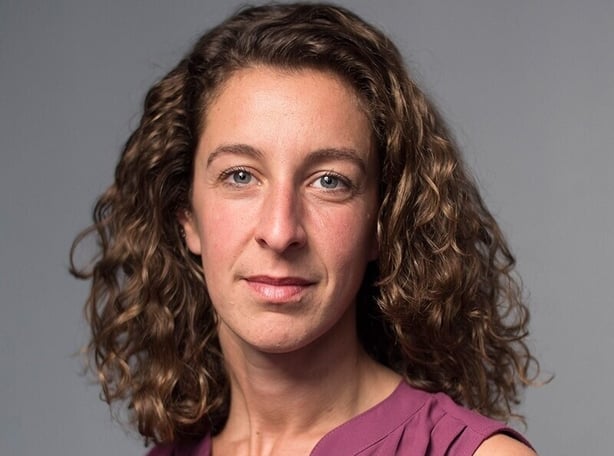
Survival International believes that Sônia Guajajara’s win, along with that of Célia Xakriabá, an indigenous educator and activist of the Xakriabá people, will help give voice to some of the most vulnerable indigenous communities in Brazil, including those uncontacted tribes who have had no contact with the outside world.
"Their wins are really important wins for the indigenous people of Brazil and the indigenous land rights struggle, because Sônia and Célia will be able to bring those questions of the protection of indigenous territories to the halls of power in Brasília," explains Ms Shenker.
She says the uncontacted tribes have "of course have no idea that there’s an election going on, or that there’s a person called Bolsonaro or a person called Lula, with the difference between the two having an existential impact on them".
Guardians of the Amazon
As part of her work in Brazil, Ms Shenker has been on operations with a group known as the Guardians of the Amazon, indigenous people from the Guajajara tribe who have been working to protect their land from loggers since 2013, due to a lack of protection from the Brazilian government itself.
She says they do this, not only for their own families, but also for their uncontacted neighbours, from the Awá tribe, who share the territory.
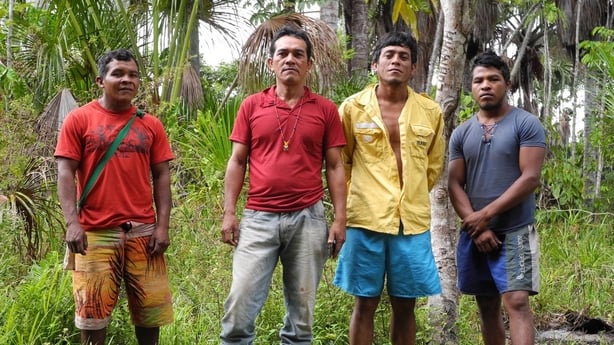
"It's dangerous work, because their enemies are highly armed and they are not," she explains.
Six Guajajara Guardians have been killed doing this work, according to Survival.
Just last month, Janildo Guajajara was shot in a logging town near the Arariboia Indigenous Territory in the Maranhão state, where he lived.
Both organisations are now calling for investigations into the killings and for those responsible to be brought to justice.
What happens next?
If elected president on 30 October, the 76-year-old former union leader Luiz Inacio Lula da Silva, has vowed to take a sharp departure from Mr Bolsonaro's environmental policies.
However, even if he wins the runoff, Indigenous candidates and those working to protect peoples living near the Amazon, do not believe things will change quickly.
"Lula winning is not going to make things perfect overnight, but at least it will give some breathing space and it will allow for some improvements in terms of the institutions that have been completely wrecked by Bolsonaro," says Ms Shenker.
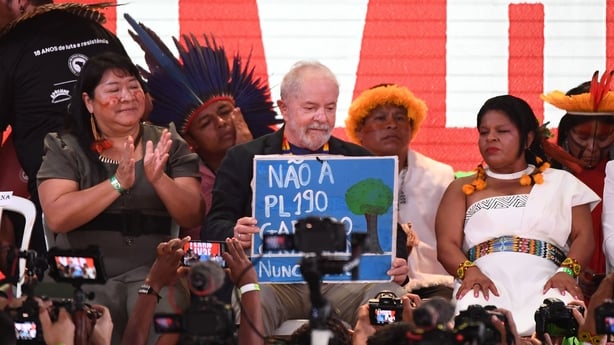
Mr Lula could also face obstacles in pushing through his policies, due to the way party votes are divided.
In the lower chamber of Congress, Mr Bolsonaro's Liberal Party (PL) was the biggest election winner, taking 99 of the 513 seats, while Mr Lula's Worker's Party (PT) won 68.
Mr Bolsonaro's party also has 13 of the 27 positions in the upper house, the Senate, whilst despite wider support from other political parties, Mr Lula’s own party has just nine.
Many of those elected have previously backed Mr Bolsonaro's policies of expanding agriculture and resource extraction in the Amazon. Among them Ricardo Salles, Mr Bolsonaro's former-environment minister.
In 2020, he was criticised by international green activists for urging Brazil's government to push through environmental deregulation, while the public was distracted by the pandemic.
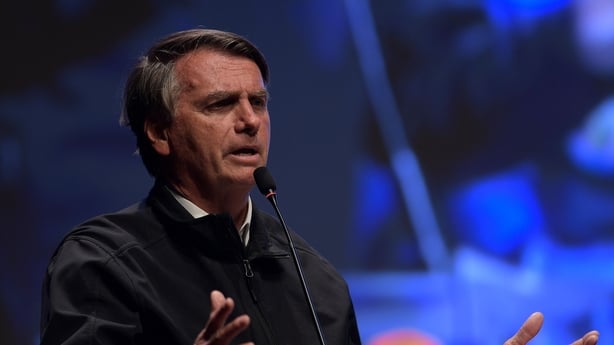
He quit his cabinet role in June 2021, facing a criminal investigation into whether he obstructed a police probe of illegal logging in the Amazon.
There was a surprisingly strong performance from Mr Bolsonaro’s Liberal Party overall on 2 October. He secured close to 43% of the vote, much better than many polls predicted, with several polling firms since criticised for underestimating his support.
Many were surprised at the runoff, which was called after Mr Lula fell almost two percentage points short of the 50% of valid votes that would have clinched him an outright victory. A tight vote in two weeks' time could also lead to legal challenges.
Organisations like Survival International say this runoff is a crucial moment for Indigenous peoples and their territories.
In a statement released after the first round voting it said that tensions are "extremely high".
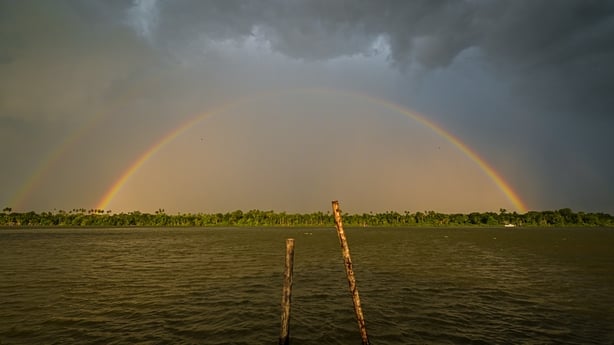
A win for Bolsonaro would provide a lethal boost to the current wave of death and devastation. More uncontacted tribes could be wiped out, their last survivors killed in the aggressive process of land theft," it stated.
Ms Shenker says that whilst her own work is about the survival of these tribes and the lands they help protect and preserve, it is ultimately crucial for protecting others against climate change.
"We’re still hopeful that Bolsonaro will not be a president for a second term," she said.
"But if he is re-elected that will be catastrophic."
Additional Reporting: Reuters and AFP







